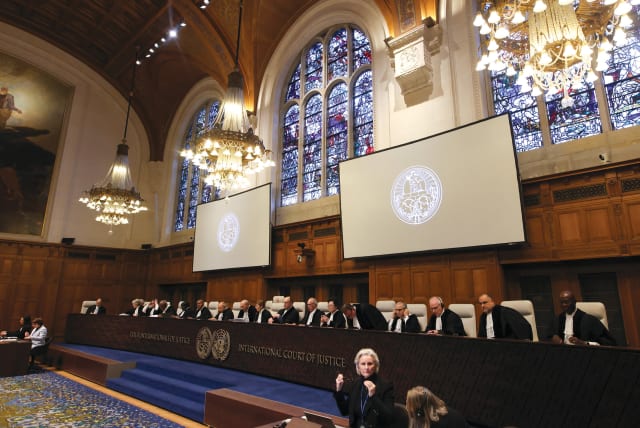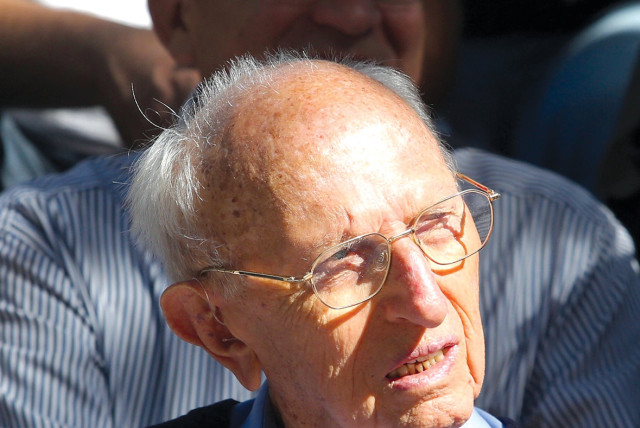14 Days: ICJ trial

Israeli news highlights from the past two weeks.
ICJ TRIAL
Israel’s legal team defended the country against South Africa’s claims of genocide in Gaza in the International Court of Justice on January 12, a day after the South African team presented its case and asked the judges to order Israel to halt its military offensive. “If there have been acts that may be characterized as genocidal, then they have been perpetrated against Israel,” declared Foreign Ministry legal adviser Tal Becker, referring to the October 7 massacre perpetrated by Hamas. The court’s 15 judges were joined by a judge each from South Africa (former deputy chief justice Dikgang Moseneke) and Israel, which chose former Supreme Court president Aharon Barak, even though he had been highly critical of the government’s judicial overhaul plan.
GAZA TOLL
On January 15, the IDF announced that 188 soldiers had been killed since the start of its ground operation in the Gaza Strip on October 27, 522 since October 7. Among the recent casualties was IDF reservist Shaul Greenglick, 26, from Ra’anana, just weeks after he auditioned successfully on a TV show that selects Israel’s entry for the Eurovision Song Contest. Among the seriously wounded while fighting as a reservist in Gaza was the well-known actor/singer Idan Amedi, who played the part of a member of Israel’s special forces in the hit TV series Fauda.
VIOLENCE SPREADS
Barak Ayalon, 40, and his mother Mira Ayalon, 70, were killed in their home by an anti-tank missile fired by Hezollah from Lebanon at northern Israel on January 14. Sgt. Shai Garmai, 19, a female Border Police officer was killed and three other officers wounded when an explosive device targeted their vehicle during clashes in the West Bank city of Jenin on January 7.
TARGETED HITS
Saleh al-Arouri, the deputy leader of Hamas, was killed along with six others in a drone strike on a building in Beirut on January 2. Hamas threatened retaliation for the assassination, which it blamed on Israel. On January 8, Hezbollah accused Israel of killing a top commander, Wissam al-Tawil in a drone strike in southern Lebanon. On January 9, senior Hezbollah commander Ali Hussein Burji, said to have been responsible for dozens of drone attacks against Israel, was killed in an airstrike. On December 25, Brig.-Gen. Razi Mousavi, a an officer in Iran’s Islamic Revolutionary Guards, was killed in an airstrike in Damascus.
HOUTHI STRIKES
The Houthi militia threatened a “strong and effective response” after the US carried out a series of strikes against them in Yemen in January, vowing to protect ships in the Red Sea from attacks by the Iran-backed rebels. The strikes fueled concerns about the escalation of a conflict that has spread across the Middle East since October 7, with Iran’s proxies entering the fray from Lebanon, Syria, Iraq, and Yemen.
CONTROVERSIAL LAW
On January 1, the High Court of Justice, in an 8-7 vote, struck down legislation that eliminated judicial use of the reasonableness standard and curtailed judicial oversight of the government. The amendment to the Basic Law to Cancel the Reasonableness Standard that passed last July was a key piece of legislation in the government’s judicial reform package. Justice Minister Yariv Levin slammed the ruling, saying it “goes against the spirit of unity needed in wartime.”
ARGENTINE SUPPORT
Argentina’s new president, Javier Milei, voiced support for Israel and its people at the opening ceremony in Buenos Aires of the Pan American Maccabi Games, an international tournament for Jewish athletes, on December 28, 2023. “I want to ratify at this moment my unalterable commitment to the State of Israel and to the Jewish people in their fight against Islamic terrorism, for peace and freedom,” Milei said, according to JTA.
MOSSAD LEGEND
Zvi Zamir, who as head of the Mossad in 1973 warned that what became known as the Yom Kippur War was imminent, died on January 2 at the age of 98. After flying to London and being informed on October 5 by a reliable Egyptian agent, Ashraf Marwan, that Egypt would attack Israel the next day, Zamir famously told his bureau chief that “tomorrow is a holiday” – a coded warning of war not properly heeded by Israel’s leadership at the time. The Yom Kippur War began on October 6, 1973. Zamir headed the Mossad from 1968 to 1974, leading a successful global search for the Black September terrorists responsible for the murder of 11 Israeli athletes at the 1972 Munich Olympic Games, which he documented in a memoir titled Eyes Wide Open.
Jerusalem Post Store
`; document.getElementById("linkPremium").innerHTML = cont; var divWithLink = document.getElementById("premium-link"); if (divWithLink !== null && divWithLink !== 'undefined') { divWithLink.style.border = "solid 1px #cb0f3e"; divWithLink.style.textAlign = "center"; divWithLink.style.marginBottom = "15px"; divWithLink.style.marginTop = "15px"; divWithLink.style.width = "100%"; divWithLink.style.backgroundColor = "#122952"; divWithLink.style.color = "#ffffff"; divWithLink.style.lineHeight = "1.5"; } } (function (v, i) { });

